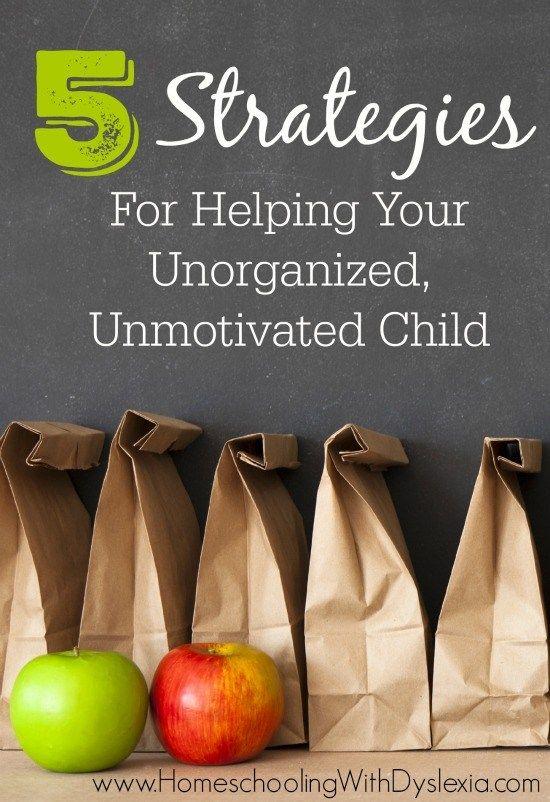If you have an unorganized child, they may need more intentional help to teach and practice basic organizational skills.

In my last post, Help For The Hopelessly Unorganized Child, we talked about signs of poor executive function which is essentially the ability to organize your thoughts – which leads to organizing just about everything else in life!
For some kids this is just a matter of maturity. These skills do improve with age. For others, the seemingly, hopelessly unorganized ones, more intentional methods are needed to teach and practice basic organizational skills.
5 Strategies for Helping the Unorganized, Unmotivated Child
Make checklists. Listing the steps involved in a task will make it easier for your child to see how to get started. It also may lessen her anxiety around planning. Checklists also provide a visual reminder of where your child left off if she got distracted. You can make checklists for everything from the tasks she has to do before heading out to Grandma’s house to how to clean the bathroom.
Set time limits. Budgeting time for tasks can be difficult. On your checklists, consider giving a time estimate for each step. If your child doesn’t read yet, you can put some inexpensive kitchen timers around the house. Set them for the amount of time your child should be spending on everything from completing a math sheet to brushing her teeth.
Use planners and calendars. Not all planners have to be on paper, which is a good thing if your child has trouble keeping track of items. You can put up a big family calendar somewhere and give your child her own colored marker. For older kids there are free or inexpensive apps and time-management software that can help.
Explain yourself. Children who have trouble thinking flexibly or who have difficulty with emotional control don’t always take feedback well or see the point of learning new ways to do things. Try to explain why it’s important to learn a new skill, or how it may save time and energy in the long run.
Let your child explain, too. If your child’s method doesn’t make sense to you, consider taking the time to ask why before saying it has to be done differently. It may actually be an inventive approach that works for your child. The more successful strategies she comes up with herself, the better!
Learn More About Teaching Organization to Kids With Weak Executive Function Skills
I first learned about the idea of Executive Function weaknesses during my Orton-Gillingham training. I immediately recognized signs of Executive Function weakness in my own kids. In fact, I was able to identify these weaknesses as the cause of some real life struggles in my adult kids at that time.
Since then, I have been researching and trying out everything that I could find in an effort to help our own brood of disorganized kids. The good news? There are plenty of research-based strategies to help your seemingly hopelessly unorganized kids build positive habits to help them in school, work and social situations.
You may be one of the few people in your child’s life who understands how having a disability complicates his or her ability to develop these skills.
Stay tuned for my new parent course bundle: Processing, Memory, and Attention and How They Affect Learning which will release mid-February.
How about you? How have you helped your seemingly, hopelessly unorganized kids?






Wow, this looks really good! Thanks for creating this resource. It will save me hours of time I would have spent researching this topic. Definitely going to get this course. Thanks Marianne!
Shawn